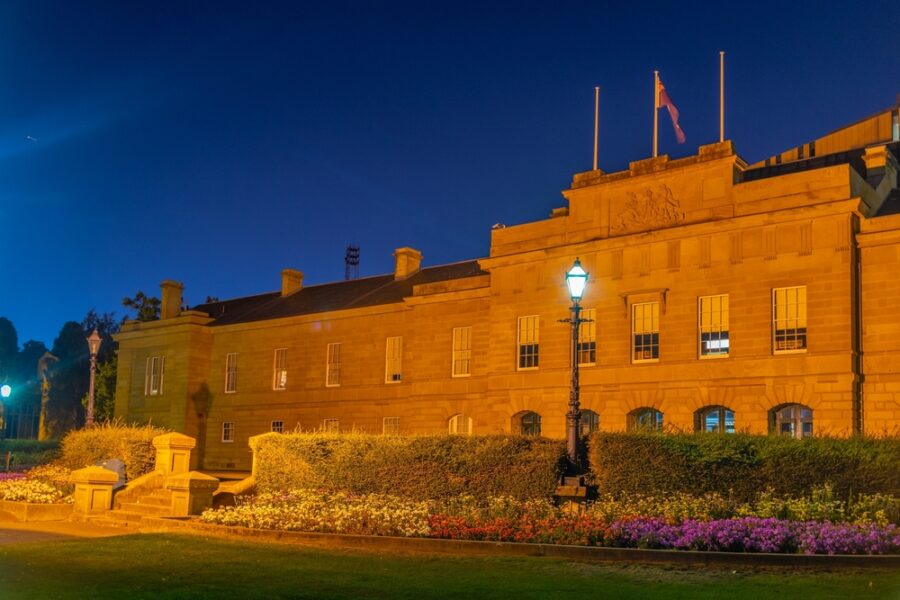Tasmania lawmakers propose banning gambling ads at state venues

Two independent Tasmanian Members of Parliament are proposing a motion that would ban gambling advertising in Tasmania.
Meg Webb, who represents Nelson, and Clark representative Kristie Johnston have put forward a joint initiative that would see the banning of gambling advertising and sponsorship at state-owned venues.
Johnson also will re-table her Private Members’ Bill alongside this, which, if passed, will force betting firms to return stolen money used for wagering.
Johnson told the Tasmanian Times the motion is a necessary step for Tasmania, saying, “the Australian government has failed to act despite a federal parliamentary inquiry recommending a ban on all in-stadia advertising. Tasmania must now show leadership by implementing that ban where it can, such as at all state-owned or funded venues.”
The ban would extend to the planned Australian Football League stadium at Macquarie Point and gambling logos on players’ uniforms. This would be consistent with recommendations made by the inquiry that Johnson cited on igaming.
Webb added, “Evidence tells us the saturation of gambling advertising, such as during sport events, is normalising gambling, especially for children and young people. The co-sponsored motion I will table in the Upper House this week seeks to provide all Tasmanians, but especially our children and young people, safe state-owned or funded facilities free from predatory gambling advertising.”
Similar measures are being implemented internationally, such as in Bangladesh, where media portals found showing betting advertisements are now being shut down.
Abi Bray brings strong researching skills to the forefront of all of her writing, whether it’s the newest slots, industry trends or the ever changing legislation across the U.S, Asia and Australia, she maintains a keen eye for detail and a passion for reporting.
Verticals:
Sectors:
Topics:
Dig Deeper
The Backstory
Why Tasmania’s debate is happening now
Tasmania’s push to bar gambling advertising and sponsorship at state-owned or funded venues lands at the intersection of public health, youth protection and political impatience with federal timelines. The proposal, led by two independents, follows a national inquiry’s call to curb in-stadium marketing but leans on what the state can control: taxpayer-backed facilities, including the proposed Australian Football League stadium at Macquarie Point and team uniforms. The backdrop is a wider policy trend in which governments are redrawing the lines between legal betting, promotion and consumer risk exposure — especially for minors and vulnerable users.
Across markets, lawmakers and regulators are revisiting how ads influence behavior in the most visible environments — arenas, schools, social feeds and mobile apps that convert attention into wagers with a tap. Tasmania’s targeted venue ban fits that pattern: bounded in scope, but designed to shrink the most normalized ad channels and test how far localized authority can move faster than national frameworks.
Ad oversight tightens near schools and campuses
U.S. states have become a testing ground for advertising guardrails that could foreshadow how Australian jurisdictions calibrate their own rules. In New Jersey, lawmakers advanced a measure to curb ads that appear to target under-21 audiences and restrict placements near educational institutions. That proposal also orders a study of which “responsible gambling” phrases truly resonate, then limits marketers to an approved set. The approach pairs placement limits with message discipline, signaling regulators want proof that disclosures do more than check a box. Read more about the New Jersey lawmakers taking action on ads near colleges and schools.
New Jersey’s effort sits alongside a separate crackdown on legally gray models. Lawmakers advanced a bill to prohibit online sweepstakes casinos that mimic real-money play through virtual currencies and prize structures while operating outside the licensing, tax and enforcement perimeter. State officials argue these platforms sidestep consumer protections, including clear fund segregation and guaranteed payouts. The move underscores a broader theme: jurisdictions are not only narrowing where ads can run but also which products should be marketed at all. See how New Jersey comes closer to banning sweepstakes casinos.
Mobile wagering expands, but with caution
While some regions pull back on advertising, others are expanding access to legal betting — and then retrofitting safeguards. Wisconsin is considering a bipartisan bill to permit online sports betting statewide via tribal operators’ apps, with servers kept on tribal land. The measure would modernize a market that currently requires on-site wagering at tribal sportsbooks, but it stops short of opening the door to national brands without state licenses. Supporters pitch legal mobile channels as a way to meet consumer demand and preserve sovereignty; critics warn the ease of digital betting can amplify financial harm for a subset of users. Lawmakers are attempting to split the difference with program design, education and oversight. Details are in the Wisconsin proposal to allow online sports betting.
The Wisconsin debate mirrors a post-legalization reality across the U.S.: once a channel is widely available, the policy frontier shifts to marketing, spending controls and addiction mitigation. For Tasmania, the lesson is that legalization and liberalization tend to be followed by stricter boundaries on how and where products are promoted — especially around youth and high-visibility public spaces. A venue-focused ad ban attempts to preempt those downstream corrections by containing exposure where the state has clear jurisdiction.
Protecting vulnerable users becomes a policy line
In Brazil, regulators are drawing a firmer boundary between legal access and social protection. The Secretariat of Prizes and Bets plans to prohibit recipients of social welfare programs from gambling, aligning with a Supreme Federal Court decision and addressing concerns that public support is being siphoned into betting. The Central Bank’s estimate that roughly one-fifth of Bolsa Família funds were spent on online gambling before formal regulation catalyzed the response. The policy, still working through legal review, shows how a rapid market rollout can be matched by targeted exclusions to shield specific groups. Read about Brazil’s commitment to ban betting for social welfare recipients.
For Tasmania’s policymakers, Brazil’s approach offers a different kind of lever: rather than focusing on ad space, it segments the customer base to reduce potential harm. Both strategies share the same objective — lowering the likelihood that high-risk or underage groups are nudged into gambling — but they attack the problem from opposite ends of the funnel. Australia’s federated system may favor Tasmania’s venue-by-venue method, yet the underlying calculus is similar: make it harder for vulnerable populations to encounter prompts that spur wagering.
Social platforms emerge as the next battleground
Even as some jurisdictions rein in physical advertising, social networks remain porous. In the Philippines, the gambling regulator faces mounting criticism for the prevalence of betting ads across major platforms, despite stricter payment rules and an outdoor ad ban. Lawmakers and advocacy groups argue that without platform-wide prohibitions and tighter brand authorization controls, digital channels will continue to route around traditional restrictions. TikTok’s suspension of gambling promotions shows platform policy can change the risk picture overnight; other networks have been more permissive, drawing scrutiny. See how PAGCOR is under pressure over gambling ads on social media.
The tension is salient for Tasmania. A state ban at government-owned venues can meaningfully shrink physical exposure, especially during televised sport, but social feeds can reintroduce the same advertising to many of the same users. Jurisdictions are increasingly pairing location-based bans with digital enforcement tools, disclosures and content restrictions. The policy question is not only where ads run, but how effectively regulators can audit and sanction campaigns that blend sponsorships, influencers and cross-border brands.
What the stakes look like for Tasmania
Tasmania’s proposal threads a pragmatic needle: act where the state has ownership and funding leverage, signal alignment with national recommendations, and fence off the most visible conduits to young audiences. Internationally, regulators are converging on a pattern — tighten ad access points, scrutinize unregulated lookalike products, and carve out or protect high-risk groups — while allowing legal gambling to operate within a narrower promotional frame. The mix of ad placement limits around schools, sweepstakes bans to close loopholes, careful online expansion, protections for welfare recipients and pushback on social media ads sketches the likely contours of the next phase.
If Tasmania moves first among Australian states on venue restrictions, it could shape national practice by demonstration. The stakes include how clubs and leagues replace sponsorship revenue, how broadcasters adapt on-air inventory, and whether digital platforms become the primary substitute channel. The core question remains unchanged across markets: how to balance a legal industry’s growth with limits that blunt harm, especially for children and financially vulnerable residents. Tasmania’s venue-focused proposal is a bid to set that balance on home turf, ahead of broader federal action.







